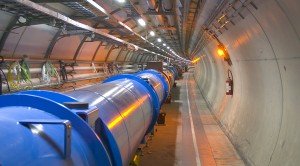The CERN Large Hadron Collider and its economical impact on the society
The CERN Large Hadron Collider (LHC) costs a lot of money to the tax-payers and there is no guarantee for any discovery. However, the benefits to the society are huge and one should not restrain ourselves from supporting large-scale research infrastructure regardless of the scientific results.
Fundamental research can bring a lot to the society (regardless of any potential discovery). I will demonstrate this statement with an example that I know about: the LHC.
This post is organized as:
- A cost-benefit analysis for the LHC?
- The costs
- Benefits to scientists
- Benefits to human capital formation and the private sector
- Benefits to the general public
- Let us stop the blabla and do the maths

A COST-BENEFIT ANALYSIS FOR THE LHC?
Let me first summarize what is the LHC and then try to show how its value can be estimated.
The LHC is a machine that has been built from 1993 to 2008 by CERN, and that is part of a full accelerator complex. This complex is maintained and operated by CERN and used by several experiments operated by dedicated collaborations of researchers from all around the world. Furthermore, the performed experimental analyses use computer power from all around the planet.
A reasonable cost-benefit analysis should therefore account for the size of the facility, the number of people involved and the past and future lifespan of the machine (from its construction in 1993 to its planned decommissioning in 2025).
What we want to calculate is the net present value of the LHC, which is given by the difference between the benefits ( B ) and the costs ( C ). If this number is positive, the LHC brings an added value to the society.
The net present value of the LHC can be evaluated as

where the sums accounts for different moments where benefits and costs are computed.
This formula also includes the social discount rate r allowing for converting a future benefit in terms of a reference taken to be today.

THE COSTS
The LHC costs are originating from three sources. One has of course the construction costs, but also the costs related to the upgrade of the machine with time and the operation costs.
Each of these three items embed both costs from the personnel side (salaries for instance) and material side.
BENEFITS TO SCIENTISTS
The benefit of the LHC to scientists is the generation of experimental data that allow to publish new research. This can be evaluated as the value of the associated publications.
Very importantly, fundamental research should stay decoupled from the applications of the potential discoveries that are very hard to estimate and thus ignored in any reasonable benefit-cost analysis.
It is however very hard to assess the value of a scientific publication. No one knows whether and when a theoretical predictions will be discovered maybe decades later, and whether it will lead to any practical applications. There is only a non-zero chance to any new knowledge could have an economic impact.
Take for instance general relativity (1917) and the GPS application today. How to assess the value of the general relativity paper in 1920?
The discovery itself as a new knowledge has nevertheless some (non-use or passive-use) value. Only this should be accounted in a cost-benefit analysis.
On different lines, it is also not that easy to estimate the impact (and thus the value) of a publication on the scientific community (track records, etc.). One possible way is to estimate that the value of a publication is equal to the salary costs that are necessary for producing it. This is what the European Union does.
Extra benefits, such as occurring from articles by non-LHC scientists citing LHC publications must also be accounted. However, all available models for calculating them show that they are negligible.

BENEFITS TO HUMAN CAPITAL FORMATION AND THE PRIVATE SECTOR
From 1993 to 2025, it is estimated that more that 35000 early-stage career researchers will take part to the LHC program that will thus have an effect on their curriculum. The related gain in experience as well as on their future earnings can be seen as parts of the LHC impact on society.
Moreover, private companies directly involved in the LHC nebula are also beneficiaries of the LHC as they will participate to the co-design with LHC researchers of new technologies (learning by doing).
Although the costs to CERN arising from procurement cannot be considered as a benefit, the methods and technologies that have been developed can be further sold by the involved companies (I recall that CERN almost never patents its own inventions).
Similarly, companies external to the LHC could also benefit from some transfers of knowledge from CERN for free.
In addition, two world-widely used software (ROOT and GEANT4) have been developed for analyzing LHC data and have been made available for free to the society.
They are now used a lot outside physics, for free, without any licensing cost to pay.
BENEFITS TO THE GENERAL PUBLIC
There is also an ensemble of direct cultural benefits of the LHC. Those beneficiaries include in particular everyone visiting CERN and its exhibitions.
Moreover, the LHC coverage in media can also be converted as a benefit (in terms of audience).
Finally, websites and social media play a role, as well as outreach activities such as project exploiting some computing time donated by users.

LET US STOP THE BLABLA AND DO THE MATHS
All of the points above can be converted in euros. This has been done in this article that is written by three of my colleagues and that has been submitted to the Technological Forecasting and Social Change journal.
One can find many details on their methodology and calculations based on European Union and CERN data as well as on interviews with many people involved in the LHC.
Please find below their summary (1 GEUR = 1 Giga-euro = 1 billion euros):
- Costs: 13.5GEUR excluding the personal costs
- Benefits to scientists: 0 EUR (compensating exactly the personal costs)
- Scientific knowledge as a public good: 3.2 GEUR
- Benefits to human capital formation: 5.5 GEUR
- Benefits to the industry: 5.6 GEUR
- Benefits to the general public: 2.1 GEUR
 [
[ [
[
This kind of thinking is fundamentally flawed. The only way to know if costs < benefit is for private individuals to make decisions. If you are spending other people's money you have not factored in the opportunity costs.
What could 13.5G EUR have been spent on instead if tax money was not spent.
What is the impact of the loss of freedom, the centralization of knowledge, and the politics of deciding which experiments to run?
Governments are using cost-benefit analyses all the time to decide whether they should invest tax-payer money in this and that project. Private individuals are never making any decision at that level. I agree that this money could have been spent otherwise, but this holds for any single project funded by a government, doesn't it?
Coming back to the LHC money, it consists at the end only of a small fraction of the money of a state. I recall that this number is integrated over more than 30 years. Fundamental science experiments are hence cheap (compared to a state budget) and could bring a lot in decades. And even if they are not bringing anything, some benefits (even if they are small) are there. This is the point I wanted to show.
Concerning the second point of your post, I am not sure to follow.
Which loss of freedom? This I do not understand at all.
Then, knowledge is not centralized: all CERN's results are publicly available and data is stored world-wide and will be made publicly available in the future (some pieces of data is already there on the web). IMO, this is not really what one could call a centralized knowledge.
Finally, to comment on the third point, at the political level, they are many discussions within the community about experiments that should be run, in particular from the scientific standpoint (we are now discussing the next generation of collider experiments). At the end, the community will decide what is good for it (and this does not mean one single experiment).
Easy to write of the masses. You should review mises on socialisms in ability to do real economic calculation.
I am sorry but I do not understand. I have only shown that one gets benefits from the LHC. I have not said that this was the way to optimize the benefits.
Should we stop funding at all any research that does not bring immediate benefits? Do you really think this is the right way to do for the future?
Well if the 13.5 billion would have been invested in Steem instead, we could have furthered the cause of free-speech, and a decentralized social media. Now that would have been a worthwile cause for humanity to pursue, instead of searching for a needle in the haystack of physics, that doesn't have immediate financial utility.
Not to mention research is always a gamble, you might end up with good results, or you might burn a lot of money that could have been much better utilized. Of course the wasted money is never talked about.
There are indeed many other ways to spend that money, and many of them are good ways as well. One could decide to build new hospitals, new schools, maybe invest in steem. Why not? One could also simply say goodbye to fundamental research on the basis that it is not the best way to optimize the benefits. Fine. That's correct (my post was only there to show that there are benefits; nothing more nothing less).
I would like however to recall that in the case of a large research infrastructure such as the LHC, the most important fraction of the benefits are stemming from the transfer of knowledge to the industry and the society for free. Think about that (the web and the GPS are two examples). No new fundamental scientific developments may close the door to awesome future applications on the long term.
I personally do not think this is the right way to do. One should not only focus on present time and close future, but also offer options to the next generations. And as I said, at the end, it is a small amount of money compared to the budget of the states.
So why closing those doors? Knowledge per se has a value and the investment to get it is not that large.
I think you misunderstood me, I am not against science or knowledge, they are important things.
But we need to do it efficiently, and we need to have a measurement system to show if the money was allocated efficiently. To my knowledge the free market is the way, with the price signals.
Think of cancer research, we have spent billions on that from taxpayer money, and we are no close to the magical cure than we were when we started, in fact new forms of cancer are popping up every single year.
If that money would have been spent in cancer prevention , instead of a magical cure, we would be far better off for example : Reducing pollution, reducing arsenic and cesium from drinking water, reducing the led from the wallpaint, etc.. all of them known cancer causes.
Thanks for the clarifications! Indeed I misunderstood you.
I am not sure the free market as such is a good way to check whether the money was spent efficiently. That is actually a discussion we already had on steemit (see for instance on this post).
Personally, I like the idea. I am fighting a lot for having everything public, freely accessible, etc (I should write more about what I did in the past few years I think; this may interest some).
However, my worry is that anyone, even people without any scientific background, could vote for or against any scientific project. The coolest project may not be the most relevant one, may even be wrong on scientific grounds, and very important projects may sound boring and thus never get funded.
Concerning your health example (quoting @lamouthe who is in the medical system), the problem in our western countries is really prevention in general. The reason is that the benefits cannot really be casted under a monetary form so that most do not care.
Note that is entirely the opposite in Asian countries where prevention plays the largest role.
Now moving on with the cancer, several forms of cancer can now be cured due to the fact that cancers can be identified very precisely and very early (thanks to research). For instance, leukaemias that were killing children 20 years ago can now be cured with an 80% success rate.
Wow that's a lot of $$$!!! I wounder when I will be able to get my quantum computer 😜
Be ready to wait... :)
Great post @lemouth! As human and consumer, we generally want fast and real results. Interesting to put numbers on how valuable is research, in science as in any other field, vs the impact on the society. It's always an interesting debate.
May I say this is very very impressive... Just a question, does CERN charge any fees to scientists from outside of CERN for using the LHC?
The short answer is no. But actually, indirectly, it could be a yes. All CERN member states contribute to the CERN budget and a (not small) fraction of it is used for operating the LHC.
Scientific institutes however do not pay directly any money to CERN for operating the LHC.
Sounds good enough actually. I guess it kind of helps scientists in other CERN member states to do good research using LHC without any actual project cost and no matter what project it is. I am saying this because i have seen more than enough of squabbles and quarrels between project owners and equipment owners , even when they are in the same institution... But again, maybe LHC is an unique equipment and any good research may or may not come out of it and that's why whatever research comes out of it may become impactful
Institutes (from any countries) build the experiments, pay for them, their operation and maintenance.
Even though the LHC is operated in Europe, the US did contribute a lot.
Although scientists obviously don't pay a "fee" as they are employees. Scientist are employed by institutes/countries which are those paying for LHC and experiments.
One should indeed distinguish the machine and the experiments. Thanks!
"We end up with a net present value of the LHC of 2.9 GEUR without including the unpredictable applications of any scientific discovery. Needless to say that even without any discovery, the LHC has brought a lot to the society."
that's how physicists try to convince themselves of the utility of the LHC... lol
Actually the big problem with the absence of major discoveries at the LHC is that it was sold as the ultimate discovery machine not at the ultimate machine to probe standard model.
So if there is no discovery it will be hard to promote better machines and get funding for them (and tbh, I always thought that a e+e- TeV linear collider would have brought more to physics than the LHC... but if LHC fails in convincing politicians that it was a huge success, there won't be any funding for another large scale experiment)
... and this is where everyone regret that the earth hasn't been swallowed by a black hole created at cern... :D
We are not trying to convince ourselves about the utility of the LHC. The LHC is useful and that's it :)
More seriously, the LHC is a discovery machine in the sense that it will explore an energy regime never probed before (in parallel of getting a lot of data in the Standard Model domain, allowing for precision measurements and probes for deviations). And an exploration does not guarantee any discovery at all. We are just exploring. Who knows what will be around the corner (nothing is a possible answer)?
In addition, the LHC is not the ultimate discovery machine. This is just wrong. The high-energy physics community is currently discussing the next generation of electron-positron and hadron colliders that could be built. In any case, I am pretty convinced that any investment will yield positive benefits for the society. And I hope that both a new electron-positron and hadron collider will be built during my lifetime.
But I fully agree with you about the problem on funding. We need to convince politicians whose lifetime as decision-takers is of about a few years that huge physics experiments are useful... And the absence of LHC discoveries does not help.
Coming back to my post, I was trying to show that taking the LHC as an investment, the society will always get some return of it, no matter we have any discovery or not.
Thanks for writing this. Works in the LHC are definitely key to unlocking the next generation of renewables, inching us slowly towards something that looks like infinity.. lol that's how inspiring posts like this are. Keep writing, and followed :)
Been looking into the CERN project a bit-- heard that it is having some nefarious effects like blowing holes in the dimensions! What we don't know can certainly hurt us!
No, no holes have been blown in the dimensions. Just fundamental aspects of the building blocks of particles have become better understood. :)
Thanks-- i hope that's true!
I have not a single doubt that the work being done at CERN is safe and well executed. I have never heard otherwise from anyone who would actually know. Have a great one!
Thank you justtryme90! Following!
You can check this press release from CERN:
https://press.cern/backgrounders/safety-lhc
That's a media story... Read physicists' comments about that and you will see that all of this is just crazy and wrong.
It doesn't matter the cost. What matters is if its fun. A lot of top scientist find this to be the biggest best and most fun toy ever for them. So its cost if free. Something only costs something is its provides no positivity.
The problem is that you cannot say that to the funding agencies... ;) They do not really care whether we have fun or not.
sure I can, because it has not run out of funds so far
I always concentrated on the unpredictability of future benefits, so it's interesting to learn that doing reasonable calculations is possible — and they yield a net positive!
👍